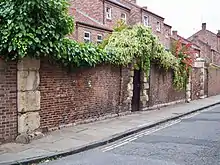Aldwark (York)
Aldwark is a street in the city centre of York, in England.
.jpg.webp)
History
The street runs inside the York city walls, and its name is presumed to refer to the walls of Roman Eboracum, which followed a similar line. The street was first recorded in the 1180s. The 10th-century church of St Helen-on-the-Walls was constructed just off the street, on what became known as St Helen's Lane, but this was demolished in the 1580s.[1]
The Merchant Taylors' Hall was built on the street in about 1415, and in the 17th- and early 18th-centuries, it was regarded as a desirable area, with several large houses constructed. The first Wesleyan Methodist chapel in the city was built at 40-42 Aldwark in 1759, and in 1892, the city's first synagogue since the resettlement of the Jews in England opened at 9 Aldwark. However, by the 19th-century, the street was run down, with many houses on the north-east side demolished for the construction of the Ebor Brewery, and various other industrial buildings being constructed.[1][2][3]
The brewery closed in 1956, and most of the other industrial buildings were demolished in the 1970s and 1980s. Their sites have been redeveloped with modern housing from the 1970s onwards, as part of an effort to encourage more people to live in the city centre. York City Council now describe the street as "a pleasant place to live and surprisingly quiet during the day considering it is so close to the bustling city centre".[3]
Layout and architecture

The street runs south-east, from its junction with Goodramgate and Ogleforth, to its junction with St Saviour's Place, Stonebow, and Peaseholm Green. St Andrewgate and the small Bollan Court lead off its south-west side, while the modern streets of Margaret Philipson Court, Hunt Court, and Pear Tree Court, lead off its north-east side.[1]
Notable buildings on the north-east side include the Merchant Taylor's Hall and its associated cottage; and the side of St Anthony's Hall; 1-5 Aldwark, built in 1770; the Oliver Sheldon House, with 15th-century origins, but largely rebuilt in 1720; and the gate piers and wall of Saltmarsh House, built in 1693, although the house itself was demolished in 1848. On the south-west side, notable buildings include the former tannery at 36 Aldwark.[1]
References
- An Inventory of the Historical Monuments in City of York, Volume 5, Central. London: HMSO. 1981. Retrieved 7 August 2020.
- A History of the County of York: the City of York. London: Victoria County History. 1961. Retrieved 7 August 2020.
- "Character Area Eight: Aldwark". City of York Council. Retrieved 22 September 2020.
